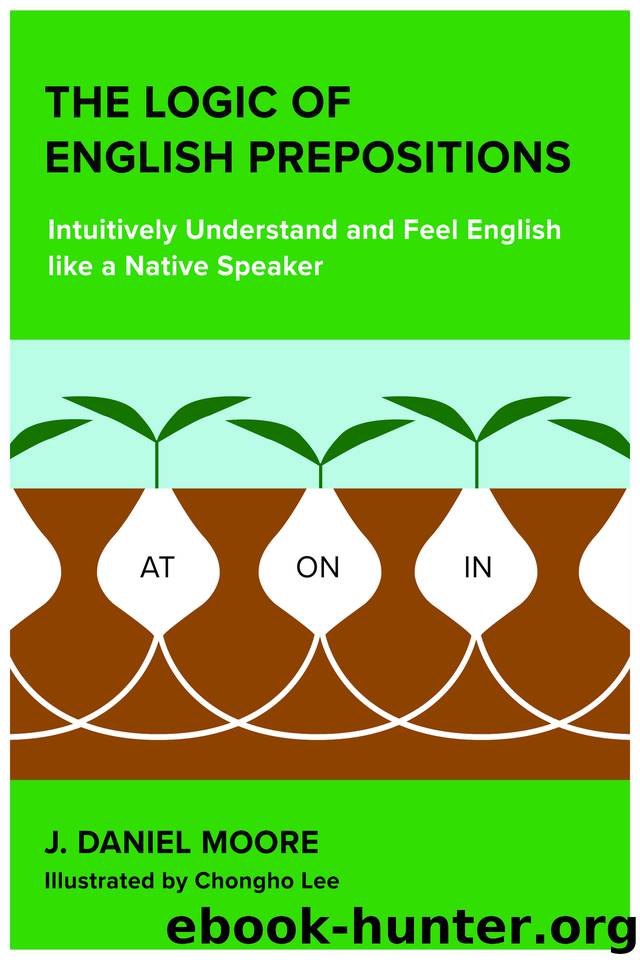The Logic of English Prepositions: Intuitively Understand and Feel English like a Native Speaker by Moore J. Daniel

Author:Moore, J. Daniel [Moore, J. Daniel]
Language: eng
Format: epub
Publisher: J. Daniel Moore
Published: 2018-07-03T16:00:00+00:00
E) Phrasal Verbs. Look up each phrasal verb and try to understand how the logic of the word “up” applies. Remember, a phrasal verb is basically a preposition put into action by a verb.
For this preposition, I’ve limited the number of phrasal verbs to 10 because there are so many and adding more would take up extra space in this book. Unlike the prepositions “of”, “to”, and “at”, the preposition “up” is used in a lot of phrasal verbs.
(Mom:) Pick up your dirty clothes and put them in the laundry basket! The phrasal verb “pick up” is easy to understand because the meaning is literal: there’s something on the floor (or some other surface) and you grab it. You’re higher than the surface you picked it up from, so it moves upward. However, in some cases, there’s an extra meaning. This sentence isn’t just about grabbing the items, but it implies “cleaning” or “organizing” of some kind. So, we have the literal meaning of part 1 (upward direction), but also the meaning of “completion” from part 3 because if you pick up all (of) your clothes and put them where they belong, you’re done and you’ve cleaned that part of the room.
He came up to me and punched me in the face. This sentence doesn’t mean that the other person is at a lower point than me (although it can mean that). It means that the person comes toward me and stops in front of me and then punches me in the face. From the perspective of that person, this is a forward direction. From my perspective, the person is coming closer to me.
Here we run into some of the details that I mentioned earlier about the prepositions “up” and “down”. (In order) to explain this sentence, we need one of those details. In the mind of an English speaker, wherever you are is like the center of your existence and this center is sort of “raised” in relation to other things. This isn’t something that native speakers are fully conscious of, but there’s strong etymological evidence to support this idea and it explains why we say things like, “I’ll meet you down at park”, even if the park isn’t at a lower position than you (we’ll discuss this example later). When we say “he came up to me”, the he’s “down” (meaning “farther away”) compared to your position and when they come closer to you, they move “up” or “upward” (meaning “closer to”) until they occupy almost the same space that you do. If that’s confusing, it will make a lot more sense later in the book.
Is there any way to warm up this room? “To warm up” simply means “to increase the warmth/make warmer”. We’ve seen before that we can use the preposition “up” with the meaning of increasing something, which is an abstract upward direction. It can also be a connection to a positive/active state because if it’s cold, there’s a lack of heat. Add more heat into the room and now the heat is existing in the room.
Download
This site does not store any files on its server. We only index and link to content provided by other sites. Please contact the content providers to delete copyright contents if any and email us, we'll remove relevant links or contents immediately.
Housekeeping by Marilynne Robinson(4449)
Papillon (English) by Henri Charrière(4275)
The Poetry of Pablo Neruda by Pablo Neruda(4110)
World without end by Ken Follett(3478)
TCP IP by Todd Lammle(3185)
Fluent Forever: How to Learn Any Language Fast and Never Forget It by Gabriel Wyner(3086)
The Rape Of Nanking by Iris Chang(2828)
How Proust Can Change Your Life by Alain De Botton(2816)
The Alchemist by Paulo Coelho(2696)
The Partner by John Grisham(2398)
Two lives by Helen Naylor(2302)
Hitler by Ian Kershaw(2199)
Yerma by Federico García Lorca(2071)
Sophie's World by Jostein Gaarder(2020)
Smilla's Sense of Snow by Peter Hoeg(1943)
Merriam-Webster's Pocket Dictionary by Merriam-Webster(1935)
Twilight of Idols and Anti-Christ by Friedrich Nietzsche(1895)
Il cavaliere inesistente by Italo Calvino(1858)
Deep Writing by Eric Maisel(1820)
